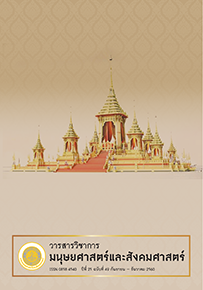ความสำเร็จตามหลักอิทธิบาท Successes Based on Iddhipadha Principle
Main Article Content
Abstract
บทความนี้ มีวัตถุประสงค์เพื่อศึกษาความสำเร็จตามหลักอิทธิบาทในพระไตรปิฎก ด้วยวิธีวิจัยเชิงเอกสาร ผลการศึกษาพบว่า ในพระไตรปิฎก 45 เล่ม อิทธิบาทปรากฏใน 28 เล่ม 762 ครั้ง แบ่งเป็น 1) พระวินัย 3 เล่ม 59 ครั้ง 2) พระสูตร 21 เล่ม 511 ครั้ง 3) พระอภิธรรม 4 เล่ม 192 ครั้ง ความสำเร็จตามหลักอิทธิบาทมี 47 อย่าง ล้วนอยู่เหนือสามัญวิสัยของมนุษย์ กล่าวคือเป็นอุตริมนุษยธรรม จัดเป็น 8 กลุ่ม ได้แก่ 1) การบรรลุอริยมรรอริยผล 2) การแสดงฤทธิ์ได้ 3) การได้ปัญญาพิเศษ 4) การทำให้อายุยืน 5) การทำให้พระศาสนามั่นคง 6) การมีความสุขในชีวิต 7) การทำให้เป็นพระอรหัตตสัมมาสัมพุทธเจ้า 8) การละอิทธิบาท เงื่อนไขของการบรรลุอิทธิบาทมี 39 ข้อ ซึ่งเงื่อนไขหลัก คือ สมาธิ ปธาน และความชำนาญในอิทธิบาทเอง การนำอิทธิบาทไปประยุกต์ในการทำงานและการเรียน สามารถทำได้ 2 แบบ คือ 1) ทำอิทธิบาทให้บริบูรณ์จนได้รับความสำเร็จอย่างใดอย่างหนึ่งตามหลักอิทธิบาท แล้วนำไปประยุกต์ใช้ซึ่งจะสำเร็จดังหวังทุกประการ 2) นำกระบวนธรรมหรือเงื่อนไขของอิทธิบาทไปประยุกต์โดยเฉพาะเงื่อนไขหลักประการที่ 2 คือ ปธาน โดยการระวังและละสิ่งที่เป็นปฏิปักษ์ต่อการเรียนและการทำงาน พร้อมกับทำให้เกิดและรักษาภาวะที่เอื้อต่อการเรียนและการทำงานนั้นให้มากยิ่งขึ้น
This article aimed to study the successes based on Iddhipada principle in the Tipitaka through the documentary research method. The results revealed that from 45 volumes, Iddhipada was found in 28 of the Tipitaka 762 times i.e. 1) in 3 volumes of the Vinaya-pitaka 59 times, 2) in 21 volumes of the Sutta-pitaka 510 times, 3) in 4 volumes of the Abhidhamma-pitaka 192 times. All of 47 successes were beyond an ordinary human nature, i.e. transcendent which was divided into 8 groups: 1) attainment of the Noble Paths and Fruits, 2) magic power, 3) exceptional wisdom, 4) life prolongation, 5) religiousst ability, 6) living happiness, 7) Full-enlightment, and 8) discarding Iddhipada. Meditation, exertion and skillfulnes, and these three were the central of 39 conditions for achieving Iddhipada. There were 2 possibilities in applicationof Iddhipada for career and education i.e. 1) one completely attained Iddhipada and gained some successes, then adapted for any expected goals and 2) one practiced the process of Iddhipadha particulary the second key condition, the exertion: preventing and destroying what opposed learning and career as well as cultivating and developing the states supporting career and education.
Downloads
Article Details
บทความทุกบทความเป็นลิขสิทธิ์ของวารสารวิชาการมนุษยศาสตร์และสังคมศาสตร์ มหาวิทยาลัยบูรพาเท่านั้น


